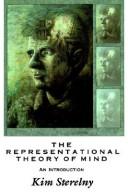| Listing 1 - 10 of 25 | << page >> |
Sort by
|

ISBN: 1840462493 9781840462494 Year: 2001 Publisher: Duxford: Totem Books,
Abstract | Keywords | Export | Availability | Bookmark
 Loading...
Loading...Choose an application
- Reference Manager
- EndNote
- RefWorks (Direct export to RefWorks)

ISBN: 0521645379 Year: 2001 Publisher: Cambridge Cambridge University press
Abstract | Keywords | Export | Availability | Bookmark
 Loading...
Loading...Choose an application
- Reference Manager
- EndNote
- RefWorks (Direct export to RefWorks)
Animal intelligence. --- Evolution (Biology) --- Philosophy. --- Animal intelligence --- Intellect of animals --- Intelligence of animals --- Animal psychology --- Instinct --- Psychology, Comparative --- Philosophy

ISBN: 063118886X 0631188878 Year: 2003 Publisher: Malden, Mass. Blackwell
Abstract | Keywords | Export | Availability | Bookmark
 Loading...
Loading...Choose an application
- Reference Manager
- EndNote
- RefWorks (Direct export to RefWorks)
Cognitive psychology --- Developmental psychology --- Brain --- Cognition and culture. --- Cognition. --- Evolutionary psychology. --- Evolution.

ISBN: 0631164987 Year: 1991 Publisher: Oxford Blackwell
Abstract | Keywords | Export | Availability | Bookmark
 Loading...
Loading...Choose an application
- Reference Manager
- EndNote
- RefWorks (Direct export to RefWorks)
Cognitive psychology --- Philosophical anthropology --- Knowledge, Theory of. --- Mental representation. --- Knowledge, Theory of --- Mental representation --- Representation, Mental --- Epistemology --- Theory of knowledge --- Abstraction --- Perception --- Philosophy --- Psychology
Book
ISBN: 1299220738 0262313030 0262018535 9780262313032 9780262018531 0262313049 Year: 2013 Publisher: Cambridge, Mass. London, Eng. MIT Press
Abstract | Keywords | Export | Availability | Bookmark
 Loading...
Loading...Choose an application
- Reference Manager
- EndNote
- RefWorks (Direct export to RefWorks)
This collection reports on the latest research on an increasingly pivotal issue for evolutionary biology: cooperation. The chapters are written from a variety of disciplinary perspectives and utilize research tools that range from empirical survey to conceptual modeling, reflecting the rich diversity of work in the field. They explore a wide taxonomic range, concentrating on bacteria, social insects, and, especially, humans.
Evolution (Biology) --- Evolutionary psychology. --- Cooperation. --- Philosophy. --- Collaborative economy --- Cooperative distribution --- Cooperative movement --- Distribution, Cooperative --- Peer-to-peer economy --- Sharing economy --- Economics --- Profit-sharing --- Psychology --- Human evolution --- Cooperativeness. --- PHILOSOPHY/Philosophy of Science & Technology --- COGNITIVE SCIENCES/General --- COGNITIVE SCIENCES/Psychology/Cognitive Psychology --- Cooperation (Psychology) --- Social psychology
Book
ISBN: 0262016796 0262526662 0262302810 9780262302814 9780262016797 9780262526661 0262300494 Year: 2014 Volume: 2012 Publisher: Cambridge, Mass.: MIT Press,
Abstract | Keywords | Export | Availability | Bookmark
 Loading...
Loading...Choose an application
- Reference Manager
- EndNote
- RefWorks (Direct export to RefWorks)
Over the last three million years or so, our lineage has diverged sharply from those of our great ape relatives. Change has been rapid ( in evolutionary terms) and pervasive. Morphology, life history, social life, sexual behavior, and foraging patterns have all shifted sharply away from those of the other great apes. No other great ape lineage--including those of chimpanzees and gorillas--seems to have undergone such a profound transformation. In The Evolved Apprentice, Kim Sterelny argues that the divergence stems from the fact that humans gradually came to enrich the learning environment of the next generation. Humans came to cooperate in sharing information, and to cooperate ecologically and reproductively, as well, and these changes initiated positive feedback loops that drove us further from other great apes. Sterelny develops a new theory of the evolution of human cognition and human social life that emphasizes the gradual evolution of information-sharing practices across generations and how these practices transformed human minds and social lives. Sterelny proposes that humans developed a new form of ecological interaction with their environment, cooperative foraging. The ability to cope with the immense variety of human ancestral environments and social forms, he argues, depended not just on adapted minds but also on adapted developmental environments
Evolutionary psychology. --- Cooperation. --- COGNITIVE SCIENCES/General --- BIOMEDICAL SCIENCES/Evolution --- PHILOSOPHY/General --- Evolutionary psychology --- Cooperation --- Biological Evolution --- Developmental psychology --- Psychology --- Human evolution --- Collaborative economy --- Cooperative distribution --- Cooperative movement --- Distribution, Cooperative --- Peer-to-peer economy --- Sharing economy --- Economics --- Profit-sharing
Book
ISBN: 9780197531389 Year: 2021 Publisher: New York, N.Y. Oxford University Press
Abstract | Keywords | Export | Availability | Bookmark
 Loading...
Loading...Choose an application
- Reference Manager
- EndNote
- RefWorks (Direct export to RefWorks)
Evolution. Phylogeny --- Cooperation --- Economic anthropology. --- Social evolution. --- Sociological aspects.

ISBN: 9781840467802 1840467800 Year: 2007 Publisher: Cambridge Icon Books
Abstract | Keywords | Export | Availability | Bookmark
 Loading...
Loading...Choose an application
- Reference Manager
- EndNote
- RefWorks (Direct export to RefWorks)
Philosophy of science --- Gould, Stephen Jay --- Dawkins, Richard
Book
ISBN: 9780631188865 9780631188872 Year: 2003 Publisher: Oxford Blackwell
Abstract | Keywords | Export | Availability | Bookmark
 Loading...
Loading...Choose an application
- Reference Manager
- EndNote
- RefWorks (Direct export to RefWorks)
Book
ISBN: 0631150129 0631150110 9780631150121 9780631150114 Year: 1987 Publisher: Oxford: Blackwell,
Abstract | Keywords | Export | Availability | Bookmark
 Loading...
Loading...Choose an application
- Reference Manager
- EndNote
- RefWorks (Direct export to RefWorks)
Philosophy of language --- 800.1 --- Taalfilosofie --- 800.1 Taalfilosofie
| Listing 1 - 10 of 25 | << page >> |
Sort by
|

 Search
Search Feedback
Feedback About UniCat
About UniCat  Help
Help News
News